- Home
- Susanna Kearsley
The Rose Garden Page 2
The Rose Garden Read online
Page 2
From the first time I’d walked up it I had thought of it like that – The Hill, for surely there could be no other hill on earth that could with more perfection test the limits of endurance. It was not its height alone, nor just the angle of its slope, though both were challenging. It was that, once you started up it, there seemed not to be an end to it – the road kept rising steadily through overhanging trees on stone and earthen banks, a punishing ascent that made the muscles of your thighs begin to burn and left them shaking for some minutes when you’d finally reached the top.
Yet being children, and not knowing any better, we’d gone down it every day to play with Mark and Susan’s school friends in Polgelly and to sit along the harbour wall to watch the fishermen at work, and in the cheerfully forgetful way that children have we’d pushed aside all thoughts about The Hill until the time came round again for us to climb it. Mark had actually carried me the final few steps, once, which was no doubt why I’d developed such a crush on him.
This time, we had the van, but even it seemed to approach The Hill with something like reluctance, and I could have sworn I heard the engine wheezing as we climbed.
From either side the trees, still bright with new spring green, closed over us and cast a dancing play of light and shadow on the windscreen, and I caught the swift familiar blur of periwinkle tangled with the darker green of ivy winding up along the verge. And then I looked ahead, expectantly, as I had always done, for my first glimpse of the brick chimneys of Trelowarth House.
The chimneys were the first things to be seen, between the trees and the steep bank of green that ran along the road – a Cornish hedge, they called it, built of stones stacked dry in the old fashion, herringbone, with vines and varied wildflowers binding them together and the trees arched close above. Then came a break in both the trees and hedge, and there, framed as impressively as ever by the view of rising fields and distant forests, was the house.
Trelowarth House had weathered centuries upon this hill, its solid grey stone walls an equal match to any storm the sea might throw at it. For all its size it had been plainly built, a two-storey ‘L’ set with its front squarely facing the line of the cliffs and the sea, while its longer side ran fairly close beside the road. In what might be viewed as a testament to the skills of its original builders, none of its long line of owners appeared to have felt the need to do a major renovation. The chimneys, dutifully repointed, were in the original style, and a few of the casement windows still had the odd pane of Elizabethan glass, through which the people who had lived here then might well have watched the sails of the Armada pass.
The house itself did not encourage such romantic fancies. It looked stern and grey, unyielding, and the only softness to it was the stubborn vine of roses that had wound their way around and over the stone frame of the front door and waited there to bloom as they had done in all the summers of my childhood.
Three-quarters of the way up The Hill, Mark took the sharp left turn into the gravelled drive that angled right again along the fifty feet or so of turf that separated house and road. The garages themselves were in the back, in the old stables at the far edge of the levelled yard, but Mark stopped where we were, beside the house, and parked the van, and in an instant we were overrun by what appeared to be a pack of wild dogs, all leaping up and barking for attention.
‘Down, you beasts,’ Mark told them, getting out and going round to take my suitcase from the back.
I got out carefully myself, not because I was afraid of the dogs, but because I didn’t want to step on them by accident. There were only three of them, as it turned out – a black cocker spaniel, a Labrador, and something that underneath all the dirt looked a bit like a setter – and with the little brown mongrel dog, Samson, who’d jumped out behind me, the pack was quite manageable. Once I’d patted all the heads and rumpled a few ears and scratched a side or two the leaping changed to energetic wagging, with the four dogs weaving round Mark’s legs and mine as we followed the curve of the path round the corner.
At the front of the house a small level lawn had been terraced out of the hillside, with hedges around it to block some part of the wind, and below that the steep green fields tumbled and rolled to the edge of the cliffs.
I was unprepared, as always, for my first view of the sea. From this high up the view was beautiful enough to steal my breath with such a swiftness that my ribcage almost hurt. There were the green hills folding down into their valley, with the darker smudges of the woods marked here and there with paler arcs of blackthorn blossom. There, too, was the harbour of Polgelly with its steeply stacked white houses looking small so far below us, and the headlands curving out to either side, already showing the first spreading cover of sea pink that made a softer contrast to the darkly jagged rock beneath. And past all that, as far as I could see, the endless rolling blue of water stretched away until it met the clouds.
Mark stopped when I stopped, turned to watch my face, and said, ‘Not quite like California, is it?’
‘No.’ This ocean had a very different feel than the Pacific. It seemed somehow more alive. ‘No, this is better.’
I hadn’t heard anyone open the front door behind us, but suddenly someone said ‘Eva!’ and, turning, I saw a young woman in jeans and a red sweater, her dark hair cut even shorter than Mark’s. This had to be Susan, I thought, though I wouldn’t have known her if we’d met away from Trelowarth. She’d only been seven or eight when I’d last been here. Now she was in her late twenties, grown taller and slender, her smile wide and welcoming. ‘I thought I heard the van.’ Her hug was just as warm. ‘Honestly Eva, you look just the same. It’s incredible. Even your hair. I always envied you your hair,’ she told me. ‘Mine would never grow like that.’
I didn’t really think much of my hair, myself. My father had liked my hair long, so I’d left it that way. It was easy enough to take care of, no styling required, and whenever it got in the way I just tied it all back.
‘Short hair suits you though,’ I said to Susan.
‘Yes, well, it’s not by choice.’ She smoothed it with a hand and grinned. ‘I tried to dye it red …’
Mark said, ‘It came out purple.’
‘More maroon, I’d say,’ she set him straight. ‘And when I tried to fix it, it got worse, so I just cut it.’
‘By herself,’ said Mark.
‘Well, naturally.’
‘I could have done as good a job as that,’ he told her drily, ‘with my garden shears.’
Their banter was affectionate, and utterly familiar, and I felt myself relaxing in the way one only did when in the company of friends.
Susan let Mark score that last point and shrugged as she told him, ‘Just drop that suitcase here for now, Claire said to bring you both round to the cottage when you got here. She’s made sandwiches.’
Mark did as he was told and then fell in behind as Susan, with the dogs bouncing round her as though they’d caught some of her energy, led the way along the front walk of the house and down the long green sweep of hill towards the sea, to the place where the old narrow coast path, trampled hard as rutted pavement by the feet of countless ramblers who came up along the clifftops from Polgelly, disappeared into the Wild Wood.
I’d given it that name the summer Claire had read me Kenneth Graeme’s timeless tales of Mole and Rat and Mr Toad. A chapter a night of The Wind in the Willows and never again could I enter that old, sprawling tangle of woods without cocking an ear for the scurrying footsteps of small unseen creatures and feeling a touch of the magic.
I still felt it now, as I followed Mark into the dim, sudden coolness. The air changed. The light changed. The scent of the woods, dank and earthy and rich, rose around me. The wood was an old one, and where it was deepest it stretched down the hill to the edge of the cliffs, but the trees grew so thickly I lost my whole view of the sea. I was closed round in branches and leaves – oak and elder and blackthorn and ghostly pale sycamores, set amid masses of bluebells.
The coast path, which entered the woods as a narrow track, broadened a little in here so two people could walk side by side, as though those who came into these woods felt more comfortable walking that way in this place where the shadows fell thick on the ferns and the undergrowth, and the high trees had a whispering voice of their own when the wind shook their leaves. But I’d never felt fear in these woods. They were peaceful, and filled with the joyously warbling songs of the birds tending hidden nests high overhead.
Susan, leading us through, turned to tell me, ‘We actually do have a badger. Claire’s seen it.’
If it was anything like the reclusive Mr Badger who had ruled the Wild Wood in The Wind and the Willows, I didn’t hold out too much hope that I’d catch a glimpse of the creature myself, but it didn’t stop me looking while we walked.
I caught the sharp scent of the coal smoke from Claire’s cottage chimney before we stepped into the clearing, a broad semi-circular space blown with green grass that chased to the edge of the cliff, where again I could have a clear view of the sea.
I knew better than to go towards that cliff – there was a wicked drop straight down from there, all unforgiving rock and jagged stone below – but the view itself, framed by the gap in the trees with the flowers and grass in between, and the glitter of sun on the water far out where the fishing boats bobbed, was beautiful.
And facing it, set tidily against the clearing’s edge, the little cottage waited for us with its walls still painted primrose-yellow underneath a roof of sagging slates.
The cottage had been rented out to tourists when I’d come here as a child, to earn a bit of extra income for Trelowarth, but apparently Claire had decided just this past year to move into it herself with all her canvases and paints, and leave the big house for her stepchildren. I couldn’t really blame her. While Trelowarth House was wonderful inside, it was an ancient house with draughts and rising damp and tricky wiring, and it took a lot of work, whereas this little cottage had been put here in the Twenties and was snugly made and comfortable.
There wasn’t any need to knock. We just went in, the three of us, and all the dogs came with us, spilling through into the sitting room. Claire had been reading, but she set aside the paperback and came around to fold me into the third hug of warmth and welcome that I’d had this afternoon.
Claire Hallett was a woman who defied the rules of ageing. She looked just as fit approaching sixty as she’d looked those years ago. Her hair might be a little shorter and a paler shade of blonde now from its whitening, but she was still in jeans and giving off that same strong energy, that sense of capability. Her hug seemed to be offering to carry all my burdens. ‘It’s so good to have you here,’ she said. ‘We were so very sorry when we heard about Katrina.’
Then, because I think she knew that too much sympathy on top of my reunion with the three of them might lead to tears I wasn’t ready yet to cry in front of anybody, she turned the talk to other things: the cottage and the decorating projects she had planned for it, and the next thing I knew we were all in the kitchen and sitting at the old unsteady table with its one leg shorter than the others, drinking Claire’s strong tea and eating cheese and pickle sandwiches as though it had been months, not years, since we’d all been together.
Susan raised the subject of the tea room she was planning. ‘Mark’s against it, naturally,’ she told me. ‘He was never one for change.’
‘It’s not the change,’ Mark said, with patience. ‘It’s the simple fact, my darling, that there’s really no demand for it.’
‘Well, we’d create one, wouldn’t we? I’ve told you, if we opened up the gardens more to tourists, we could bring them by the busload.’
‘Buses can’t come through Polgelly.’
‘So you’d bring them in the other way, across the high road from St Non’s. The tourists go there anyway, to see the well – they could come on here afterwards, for lunch.’ Her tone was certain, as she turned to her stepmother. ‘You’re on my side, surely?’
‘I’m staying out of it.’ Claire leant across both of them to pour me a fresh cup of tea. ‘I’ve given up the running of Trelowarth to the two of you, you’ll have to work it out yourselves.’
Susan rolled her eyes. ‘Yes, well, you say you’ve given up Trelowarth, but we all know you could never―’
‘If you’re wanting an opinion,’ Claire said lightly, ‘you might think of asking Eva. That’s her job, you know – promoting things, and dealing with the public.’
Suddenly Susan and Mark were both looking at me, and I shook my head. ‘I think I should stay out of it, too.’
Mark’s amusement was obvious. ‘Sorry, there’s no likes of that, not with Susan about. She’ll be picking your brains the whole time that you’re here.’
Susan said, ‘You will stay for a while, won’t you? Not just the weekend?’
‘We’ll see.’
Claire, who’d been watching me quietly, glanced at my hand. ‘That’s your mother’s ring, isn’t it?’
‘Yes.’ The gold Claddagh ring that Bill had slipped from Katrina’s still finger and given to me in the hospital room. It had come to my mother from her Irish grandmother who’d moved across into Cornwall and who, by tradition, had passed down this small ring of gold with its crowned heart held lovingly by two gloved hands, a reminder that love was eternal.
Claire smiled, understanding, as though she knew just what had brought me here, why I had come. Reaching over, she covered my hand with her warm one and said, ‘Stay as long as you like.’
CHAPTER THREE
When we came out of the Wild Wood by the coast path and turned up to climb the slope of field towards Trelowarth House, the sun had sunk so low it stretched our shadows long in front of us and glittered in the windows that were watching our approach.
The dogs, having patiently waited while we had our visit with Claire, were all bouncing round Susan now. ‘Feeding time,’ she told us, before taking the dogs round to the back of the house. That was how we’d most often gone in, through the kitchen, but Mark had left my suitcase just inside the main front door, so I went that way with him now and in through the more formal entrance with its short flight of steps and the vine trailing over the lintel.
As I followed Mark through and he switched on the light, I was happy to see that the house hadn’t changed; to inhale the same scents of old polished wood and wool carpets and comforting mustiness, here in the spacious square hall. Once, this whole space had most likely been panelled in the same wine-dark wood as the sitting room door on my left and the staircase that angled up just behind that to the bedrooms upstairs, but some earlier Hallett had covered the panelling over with plaster, no doubt in an effort to make the great space seem more welcoming.
On my left and beyond the great staircase, a narrower corridor carried on back to the games room and the kitchen at the rear of the house, and off to my right lay the doors to the dining room and the big front room.
Beside me Mark waited, my suitcase in hand. ‘We weren’t sure if you’d want your old room, or—’
Their thoughtfulness touched me. ‘Yes, please.’
He let me go first up the stairs. They were old stairs, as old as the house, running up from the hall at a perfect right angle to pause at a half-landing before doubling back on themselves for the final rise up to the first floor. The stair steps themselves were of stone, worn concave at their centres by centuries of climbing feet, and the walls of both stairway and landing were still the original panelling, wood of the same dark mahogany hue as the old doors downstairs, so that while I was climbing I couldn’t help feeling I’d somehow stepped into the past.
The first floor looked rather less ancient, with carpets to cover the old floors and softly striped wallpaper brightening things. There were furnishings here that I didn’t recall, but I knew my way round.
And I knew which door led to the room I had shared with Katrina. Being in the far front corner, closest to the road, it had three windows – two that loo
ked towards the sea and one that overlooked the drive, that last one set beside the fireplace with its screen of flowered needlepoint in front.
The double bed still sat in the same place it always had, its headboard to the west wall so its footboard faced the fireplace. Katrina and I had both slept in that bed when we’d stayed here, the six years’ gap between our ages making me a nuisance to her, keeping her awake by constant chattering, or stealing more than my share of the covers.
I smiled faintly at the memories, even as I felt the stabbing pain of loss. I fought it back and found my voice as Mark came up behind me in the doorway, and I said, ‘You’ve moved the pictures. The old shepherd and his wife.’
‘Oh, right.’ He looked above the bed, where I was looking. ‘They’re in the dining room, I think.’
‘It’s just as well. They had those eyes that always watched you.’
Mark set the suitcase by the bed, and looked around in friendly silence for a moment. Then his gaze came round to me. ‘How are you doing, really?’
I didn’t meet his eyes directly. ‘Fine. I’m fine.’
‘You’re not.’
‘I will be. It takes time, I’m told.’
‘Well, if you need to talk, you know I’m here.’
‘I know.’
He touched my shoulder briefly as he passed. ‘You know the house,’ he said. ‘Just make yourself at home, then.’
‘Thanks.’
The door had a lock, but we’d never been allowed to lock the door as children and I didn’t feel the need to do it now.
There were, in fact, three doors into this room. Trelowarth House was a proper smuggler’s house, with doors that led from room to room as well as to the corridor, a feature that had made it unsurpassed for games of hide and seek. Just as the smugglers had been able to evade capture by sneaking from one room to another while the customs men were searching for them, so we children had slipped secretly between the upstairs rooms to the frustration of whoever had been ‘it’.

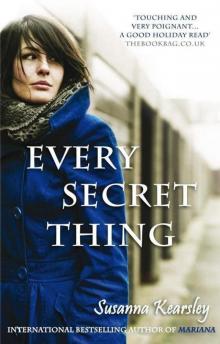 Every Secret Thing
Every Secret Thing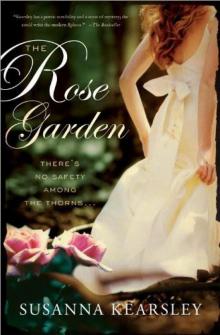 The Rose Garden
The Rose Garden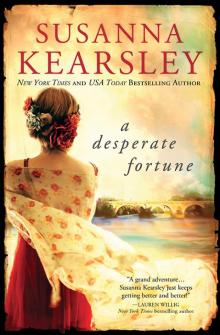 A Desperate Fortune
A Desperate Fortune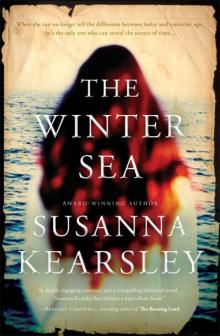 The Winter Sea
The Winter Sea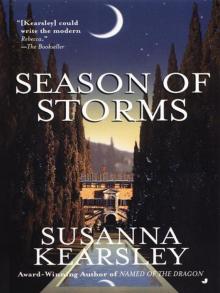 Season of Storms
Season of Storms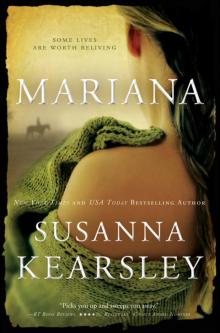 Mariana
Mariana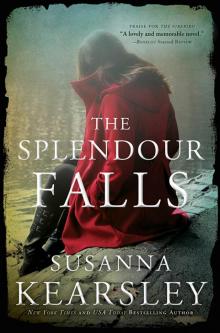 The Splendour Falls
The Splendour Falls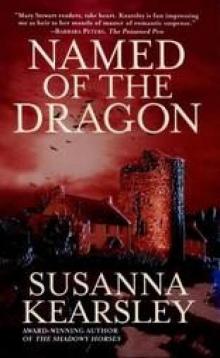 Named of the Dragon
Named of the Dragon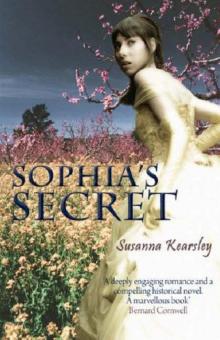 Sophia's Secret
Sophia's Secret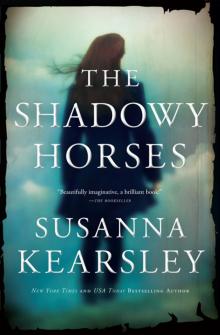 The Shadowy Horses
The Shadowy Horses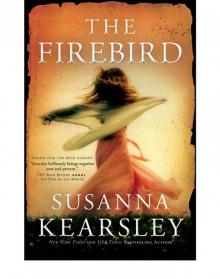 The Firebird
The Firebird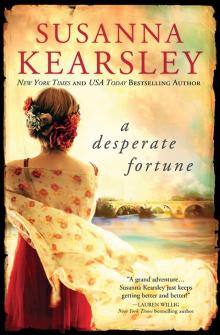 Desperate Fortune
Desperate Fortune